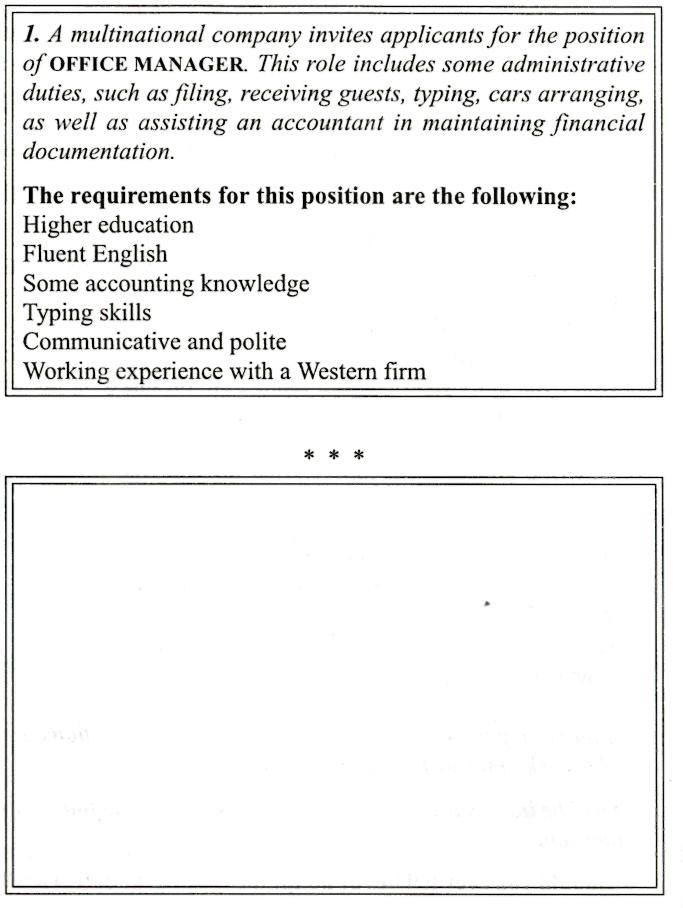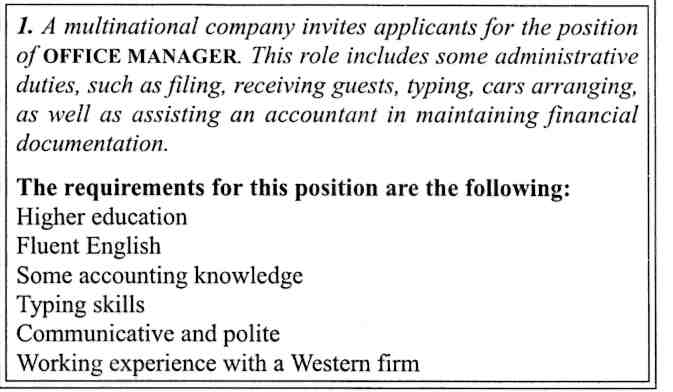
- •Министерство образования и науки Российской Федерации
- •Master Students English Professional Training
- •General Scientific Method and Scientific Research
- •Experiments
- •Formal sciences
- •B) Try to comment on the following notions with your partner(s):
- •Task 2. A) Read the text about the ideal scientific supervisor and say which of these traits your supervisor possesses. The Ideal Scientific Supervisor
- •Approaches to Managing Quality
- •2. A multinational chemical company is now looking for personal assistant
- •Interview.
- •II. Read the following extract from a book on management skills. Does it change any of your answers to the questions in point I?
- •III. Think of a suitable title for the extract.
- •From the context, explain what each of the following means:
- •IV. Try to answer the questions expressing your attitude towards the author’s
- •Choose four of five phrases from the extract that you think would be
- •1. What do the names of companies around the world reflect?
- •How Skype Is Changing the Interview Process?
to General Manager. Who will assist GM in all
aspects of his work,
providing administrative and secretarial support.
The professional qualities needed:
Higher education
Fluent English
Working experience in a Western firm
PC skills (Word processing, Data Bases)
Willingness to work long hours
Presentable appearance
Pleasant personality


2. A multinational chemical company is now looking for personal assistant
B) Decide and make notes of what questions you would ask applicants at an
Interview.
C) Distribute the roles and arrange the Interview using the questions prepared.
Task 8. I. Many universities and other institutes of higher education teach Business
Studies or Management Studies.
A) What do you think these courses involve? B) How useful do you think such courses are? С) Would you consider following this type of course? Give reasons for your answer.
II. Read the following extract from a book on management skills. Does it change any of your answers to the questions in point I?
The Harvard Business School, on the east coast of America, is one of the best respected centres for management education in the United States.
Robert Heller gives his view of its success rate in his book The New Naked Manager.
Executives, the most intensively educated group of adults in society, are very possibly educated to the least effect. The teaching of executives has been the best-paying branch of education, and by a very long way. It has also been a soft market; only a few heretical voices have ever questioned whether you can really teach executives, that is, make them better at their jobs by any general course of instruction, short or long.
Although executives should be numerate (and many are not), they don't require skills in higher algebra, and many great businesses have been created by men who all but count on their fingers 20. A story tells of two schoolboy friends, one brilliant at maths, one innumerate to the point of ′idiocy, who meets much later when the first is a professor and the second a multi-millionaire. Unable to control his curiosity, the professor asks the figure-blind ′dunderhead how he managed to amass his fortune. It's simple,' replies Midas. 'I buy things at a dollar and sell them for two dollars, and from that 1% difference I make a living.' The business world is full of successful one-percenters who live, not by their calculators, still less their personal computer, but by knowing the difference between a buying price and a selling price. It is also full of clever fools who work out elaborate discounted cash flow sums to justify projects and products that a one-percenter would laugh out of sight.
The clever fool syndrome would explain why one controversial study of Harvard Business School students found that, after a flying start, the alumni (presumably among the ablest young men of their 40 day) gradually slipped back to the general level inside their chosen management hierarchies. A Harvard graduate has no reason at all to suppose that he will manage more effectively than a less instructed contemporary. The Harvard man can only claim that he is more highly educated; and high education and high achievement in practical affairs don't necessarily go together. John F Kennedy found that assembling America's brightest brains in Washington neither got bills through Congress nor avoided the Bay of Pigs; and many companies have discovered that business-school diplomas are a thin defence against incompetence.
An overwhelmingly large proportion of the highest and best American executives did study business. All this proves is that an overwhelmingly large proportion of business-minded undergraduates got the real message, which is that a diploma will be good for their careers, starting with starting salaries. It does not follow that the education was of any other direct I benefit either to the executive or his firm. Nor does it follow, of course, that the schooling was wasted. As a general rule, the wise man recruits the finest intelligence he can find; and good minds are far better for good training. The question is only whether academic training in subjects that seem to have some connection with management is the best education for managing, and that is something that nobody can prove either way.
